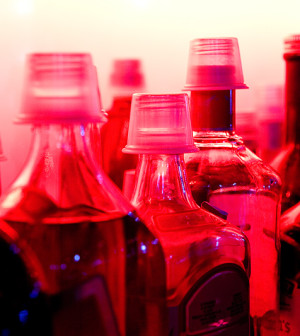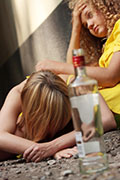- Could Your Grocery Store Meat Be Causing Recurring UTIs?
- Are You Making This Expensive Thermostat Error This Winter?
- Recognizing the Signs of Hypothyroidism
- 10 Strategies to Overcome Insomnia
- Could Artificial Sweeteners Be Aging the Brain Faster?
- Techniques for Soothing Your Nervous System
- Does the Water in Your House Smell Funny? Here’s Why
- Can a Daily Dose of Apple Cider Vinegar Actually Aid Weight Loss?
- 6 Health Beverages That Can Actually Spike Your Blood Sugar
- Treatment Options for Social Anxiety Disorder
College Alcohol Violations Often Draw a Slap on the Wrist: Study


Light penalties are the norm for U.S. college students involved in alcohol-related offenses and incidents, a new study says.
The researchers examined campus police/security responses to serious, underage, and less serious alcohol-related incidents on and off campus at 343 colleges across the nation.
Law officials were not likely to issue citations to students for violations of alcohol laws. And students were typically referred for discipline to university officials, rather than being charged and having to appear in court, the study found.
And, those minor consequences may be one reason why binge drinking is such a problem among college students, the study authors suggested.
“There is wide variation between colleges in binge drinking rates,” one of the study’s authors, Toben Nelson, an associate professor in the School of Public Health at the University of Minnesota, said in a university news release. Nelson and his colleagues believe that binge drinking rates may be driven by environmental factors.
Those factors include easy availability of alcohol, fraternity houses and college-rental houses that serve alcohol at parties, low-cost alcohol due to cheap drink specials and low state and local taxes on alcohol, along with heavy marketing of alcohol, according to Nelson.
“These factors, in addition to a student social life that emphasizes drinking such as fraternity and sorority life, and spectator rather than participatory collegiate athletics, create an environment where binge drinking is a normative and expected part of college life,” Nelson said.
The study authors also found that students involved in alcohol-related offenses and incidents were generally not directed to a campus health center for alcohol screening or intervention, and that parents were rarely contacted.
The findings appear in the August online issue of the journal Alcoholism: Clinical & Experimental Research.
“Our study is the first to examine enforcement actions for alcohol laws by campus police and security agencies in a large, nationally representative sample of colleges,” Nelson said.
“These results clearly show that the most popular activity is to communicate with other campus personnel,” Darin Erickson, assistant professor in the School of Public Health, said in the news release.
“This is important because it shows enforcement is not just about writing citations, but embedding the activity in the large campus context. Second, the rates of citations, even for ‘serious’ incidents, are fairly low. This approach, while maybe considered fair or compassionate, may possibly undermine enforcement efforts by removing the severity of consequences. Finally, this lack of citations seems most concerning at small, private colleges that likely have security as opposed to police,” Erickson said.
Whatever the size of the school, alcohol infractions present colleges an opportunity to help students.
“Students who are having difficulty with alcohol are likely to come to the attention of campus police or for other disciplinary reasons before they are identified by the health center. We encourage colleges to better integrate their systems, including campus police/security and health centers, so that students who are at-risk can get the services they need, such as evidence-based counseling, brief intervention and treatment,” Nelson said.
More information
The U.S. National Institute on Alcohol Abuse and Alcoholism has more about college drinking.
Source: HealthDay
Copyright © 2026 HealthDay. All rights reserved.










